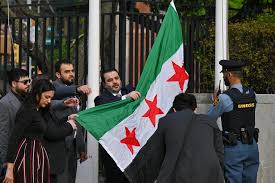Syria has provided a written response to a list of eight American demands for a possible partial easing of sanctions, stating it has fulfilled most conditions while others would require “mutual understandings” with Washington, according to a copy of the letter reviewed by Reuters.
Last month, the United States handed Syria a list of eight demands, including the destruction of any remaining chemical weapons stockpiles and assurances that no foreigners would hold senior leadership positions.
Desperate for sanctions relief to revive an economy battered by 14 years of war, Syria has faced sweeping U.S., British, and European sanctions aimed at pressuring former President Bashar al-Assad.
In January, the U.S. issued a six-month sanctions waiver to encourage humanitarian support, but its impact was limited.
Sources told Reuters in March that Washington could extend the suspension for two years—and potentially issue another waiver—if Syria fully complies with the demands.
Reuters was the first to report that senior U.S. official Natasha Franceschi handed over the list to Syrian Foreign Minister Hassan Asaad al-Shibani during a sideline meeting at the Syria Donors Conference in Brussels on March 18.
In his first speech before the UN Security Council on Friday, Shibani sought to demonstrate that Syria was already addressing key U.S. concerns, including chemical weapons dismantlement and efforts to locate missing Americans, such as journalist Austin Tice.
Shibani’s public remarks closely mirrored Syria’s private letter to Washington, which had not been previously reported.
Two Western officials and a Syrian official familiar with the letter confirmed its authenticity to Reuters.
Key Points from Syria’s Letter
In the four-page document, Syria pledged to:
-
Establish a liaison office at the Ministry of Foreign Affairs to aid in locating missing American journalist Austin Tice.
-
Expand cooperation with the global chemical weapons watchdog to address remaining chemical weapons stockpiles.
However, the letter was less detailed on critical issues such as:
-
The removal of foreign fighters from senior military ranks.
-
Granting U.S. forces permission to carry out counter-terrorism operations inside Syria.
A U.S. State Department spokesperson confirmed that Washington had received Syria’s reply to its request for “specific, concrete trust-building measures” but said it was still assessing the response and had no comment at this time.
The spokesperson emphasized that the U.S. does not recognize any entity as the government of Syria and that future normalization would depend on the actions of the interim authorities.
The Syrian Ministry of Foreign Affairs did not immediately respond to a request for comment.
Foreign Fighters Issue
The letter acknowledged discussions with former U.S. envoy Daniel Rubinstein regarding the presence of foreign fighters but said the issue “requires broader consultations.”
It confirmed the suspension of new military rank promotions following a controversial move in December that elevated six foreigners—reportedly including Uyghur, Jordanian, and Turkish fighters—within Syria’s armed forces.
The letter did not clarify whether those promotions were revoked or what future steps Damascus would take.
A source familiar with the Syrian government’s internal deliberations suggested that Damascus intended to delay addressing the foreign fighter issue as long as possible, viewing it as sensitive given the role of non-Syrian militants in overthrowing Assad.
Regarding the U.S. request for coordination on counter-terrorism operations, Syria’s letter stated that this would “require mutual understandings,” without offering explicit authorization for American airstrikes—a contentious issue given Syria’s history of foreign military interventions.
The Syrian government pledged not to allow any threats to American or Western interests to arise from Syrian territory, stating it would take “appropriate legal measures” without elaborating.
Previously, interim President Ahmad al-Sharaa said that American forces in Syria were operating without formal approval and that any presence should be subject to Syrian consent.
A Syrian official familiar with the letter said authorities were exploring ways to weaken extremist groups without granting the U.S. direct authorization to launch strikes.
Progress and Unfinished Business
According to a senior diplomat and another person briefed on the letter, Syria effectively addressed five of the eight demands, while others remained “pending.”
The letter was reportedly sent on April 14, just ten days before Shibani’s arrival in New York to address the Security Council.
It remains unclear whether Washington has formally responded to the Syrian communication.
Sources said Shibani planned to discuss the letter’s contents with U.S. officials during his New York visit.
Syria expressed hope that the steps it has taken—described in the letter as “guarantees”—would lead to comprehensive discussions on outstanding points, including reopening embassies and lifting sanctions.
Palestinian Armed Factions
On the issue of armed Palestinian factions operating in Syria, the letter stated that Sharaa had established a special committee “to monitor the activities of Palestinian factions,” adding that no faction operating outside the control of the Syrian state would be permitted.
The letter preceded Syria’s recent arrest of several Islamic Jihad officials.
“In principle, we will not allow Syria to become a source of threat to any party, including Israel,” the letter affirmed.
Syria also acknowledged “ongoing coordination” with U.S. counter-terrorism officials based in Amman, Jordan, regarding the fight against ISIS, and indicated a willingness to expand this cooperation.
No previous reports had disclosed the existence of direct Syria–U.S. counter-terrorism communications in Amman.


